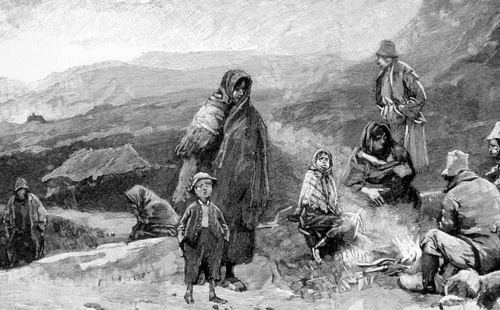A Story About an Ordinary Woman

Photo Credit: Everett Collection - Shutterstock
A Story About an Ordinary Woman
There once was a woman in Fermanagh,
Who died in the height of the famine.
Her children left Ireland in a coffin boat,
Setting sail on their way to Manhattan.
Setting sail on their search for a muffin.
And so it was for my great-great-grandmother. She did, in fact, die at the height of the famine - Ireland’s Great Hunger. And her children, or at least some of them, boarded a coffin ship bound for New York Harbor in Manhattan. But this woman, whose death, as legend has it, was the reason my great-grandfather and his siblings (not sure how many, at least 2 and possibly 2 or 3 more), holding on to hope, came to North America and why there are now lots and lots of American and Canadian McGavins. And as it is Women’s History Month and St. Patrick’s Day, I wonder about her, my great-great-grandmother. I wonder what happened to her. I wonder what she looked like. Was she pretty? Was she bright? Was she kind? Did she have that McGavin twinkle in her eye? Did she have hope for her children as she lay dying? I wonder where they lived and how many children she bore and how many of her family died from the famine and what the famine was really like where she lived in Fermanagh County, Ireland. All I know for sure is that she died and then her children, or some of her children, perhaps all of her surviving children, left home, without their father, and traveled across the sea to America with nothing in their pockets but hope. And they were all children. My great-grandfather was only about 12 or 14, his older brother a few years older and his younger brother younger by a few years. And I am here, well fed and healthy, because my great-great-grandmother succumbed to famine and somehow her children carried hope in their pockets.
And so it was for my great-grandfather, as a child of the famine that drove millions to die and millions more to leave Ireland in search of food.
What I know about the famine, or The Great Hunger, is that the British were more than happy to see Ireland emptied of the Irish, whether by immigration or by starvation. Ireland’s farmland was rich and produced much of the food - including cattle and other farm animals - for England. Wealthy landowners relied on plentiful tenant farmers to produce the crops which were then sent to England. The Irish people were introduced to potatoes which became their staple. When a blight hit the potato crop, the tenant farmers had nothing to eat and they starved by the millions. The beautiful crops were not available to them. Landowners routinely turned tenant farmers out onto the street with little reason other than to split the plot of land into several parcels and make twice or three times the rent. And what of my ancestors living in the squalor that was Ireland? Was it as horrible as described? With people dying where they dropped to the ground, exhausted from hunger, wearing only rags? Was this the fate of my great-great-grandmother? And was she found in a dying heap by her children? Was their father too weak to work, too tired to raise the children or fearful that there was no future for them in Ireland? Or rather, was he hopeful that they might flourish across the sea? But why didn’t he leave with them on the way to a better life? Did he die a broken man in Ireland? Did he die of hunger or of a broken heart after losing his wife and sending away his children?
My great-grandfather and his 2 brothers, carrying nothing in their pockets but hope, made there way to New York harbor and then to Canada, barefoot after walking from New York to what is now a two hour drive north of Detroit, MI, in Ontario. There they set up farms, got married, had lots of children - each of them 6 or 7 - and became pillars of their community and their legacy in their region is profound. And would this have happened had their mother not died? Might they have stayed in Ireland and suffered and struggled and perhaps eked out a living or perhaps died meeting the same fate as their mother - starving, ragged, miserable with not so much as even hope to hold on to.
And yet, here we are, lots and lots of McGavins, healthy, no longer hungry, able to celebrate being Irish in America, children, grandchildren, great-grandchildren and so on, of the ones who survived The Great Hunger, the ones who escaped, holding desperately to the hope that life could be good. And here we are, having learned that now, we can know with certainty that hope is a precious thing to hold on to.
My great-great-grandmother died and left her children with nothing, nothing, nothing but the hope of a better life across the ocean and her dying set in motion that her great-great-grandchildren would live in North America with plenty to eat. For you see immigration is an act of hope. My great-grandfather and his siblings sailed across the sea on the sorrow and hope of their mother, whose name and likeness is unknown but whose legacy spreads among the crops and farms and families in Ontario and on and on and on into cities and towns across the world.





